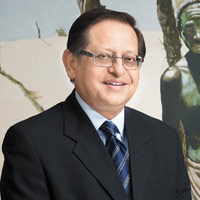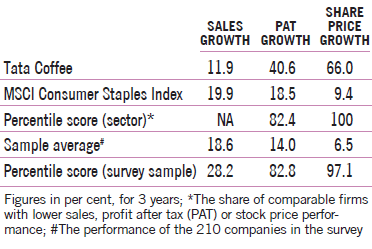The Tata Coffee chief gets the brew right to claim the No. 2 title
RANK 2 (MID SIZE COMPANIES)

RANK:2(MID-SIZE COMPANIES)
HAMEED HUQ, MANAGING DIRECTOR, TATA COFFEE (Jagadeesh NV)
On a cool November Sunday morning, a threesome waits to tee off on the first hole at the Karnataka Golf Association course in Bangalore. Hameed Huq is convincing one of his partners, a tea drinker, to shift to coffee: the one his company makes. The 60-year-old, Assam-born managing director (MD) of Tata Coffee has spent 35 years in the coffee business. Coffee is a passion, though he admits to drinking just 3-4 cups a day. He is also a Tata Group lifer; the past 13 in Tata Coffee. “For 10 years, growth stagnated,” says Huq. “It is a commodity business, where revenues and growth are volatile.” Tata Coffee is a B2B coffee business — branded coffees are owned by Tata Global Beverages — and subject to the vagaries of the commodity cycle. When he took over as MD in 2007, the company’s revenues from the plantation business were Rs 250 crore. Production cycles were unstable, and quality was not the greatest. His first steps: stabilising the cycle, improving quality and entering the market for specialty, gourmet coffee.
“Our buyers are mostly in the US, though the former Soviet Union countries are a big export market,” he says. His clients include Costa Coffee, Starbucks and Atlantic Coffee. As environmental sustainability is a big factor in developed country markets, green coffee is an area Huq has directed the company to get into; margins are anywhere between 6 and 20 per cent, he says. He is a great believer in technology too. That is only natural; he has studied the processes in Colombia, the world’s biggest coffee exporter.

So how did his firm manage to do so well? “How do you drive a commodity business that has no consumer brand?” he asks. “You take out the volatility.” Tata Coffee, which has about 8,000 employees, bought Eight O’ Clock Coffee, the third-largest whole-bean coffee firm by volume in the US. The move has been good for the bottom line, besides giving Tata Coffee a foothold in the US, which contributes about Rs 800 crore in revenues annually. The other Rs 500 crore coming from domestic sales. Whatever Huq has done, it appears to have worked. Sales have grown three times since 2007 and the company’s market cap has grown five times.
The immediate future, however, looks a little grim. Revenues are sluggish, due to the 2008 crisis. Sales in the former Soviet Union countries do not provide high margins. “People are a problem,” adds Huq. “We still need workers, and too many are migrating out of plantations.” Tata Coffee is investing in its workers. For instance, it is ensuring that the living standards of workers and their families are at a level comparable with workers in developed countries. The next three years will be difficult. Recovery from 2008 is likely to be slow and long. If there is a 2011 European crisis, it might be longer. Huq may need to drink more than his 3-4 cups a day, and the coffee will have to be stronger.
(This story was published in Businessworld Issue Dated 26-12-2011)
source: http://www.businessworld.in / Home> Business> Corporate / by Srikanth Srinivas / December 17th, 2011

